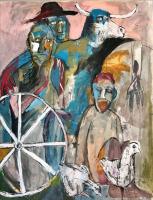 The construction of postmemory is a complex process which may take place in very different ways and, as is worth repeating, is never simply based on transmission, but, rather, implies an active positioning, a decision, on the part of members of a second generation. Such a decision is never simply played out at a strictly rational level, it inevitably presupposes a high degree of emotional involvement.
The construction of postmemory is a complex process which may take place in very different ways and, as is worth repeating, is never simply based on transmission, but, rather, implies an active positioning, a decision, on the part of members of a second generation. Such a decision is never simply played out at a strictly rational level, it inevitably presupposes a high degree of emotional involvement.
To read
30.11.2019 | by António Sousa Ribeiro